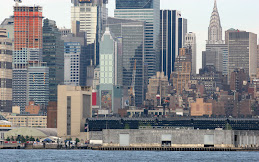Thousands of years old though it may be, the Torah began anew on a recent Sunday with Helen Margalith, 92 years old. She faced the congregation, then stared at the seeming immensity of a blank white sheet of unblemished parchment. A sofer, or scribe, sat by her side, holding a feather quill. She tentatively grasped it an inch above his hand.
"Hold it gently,” said the scribe, Neil H. Yerman, coaching her to write the first letter as they both held the quill. “Now down, toward me.” The ritually blessed black gall ink marked the page as she exerted pressure. “And again.”
It was done, then: the first letter of the Bible, Bet, in Hebrew. “Beautiful!” Mr. Yerman exclaimed. She beamed. Wild applause erupted from the 300 congregants who had gathered in witness.
Soon — after five other members of the Stephen Wise Free Synagogue had also written letters — there appeared the six-letter Hebrew word often translated as “In the beginning”: the first word of the Torah.
Ammiel Hirsch, the senior rabbi of the synagogue, on West 68th Street in Manhattan, told the congregation that “our expectation is that every single one of us will participate in some way in drafting this Torah,” honoring the 613th and final commandment, in Deuteronomy, interpreted to mean that Jews must write a Torah.
The effort is rare in that Rabbi Hirsch hopes that as many as possible of the Reform temple’s 700 families — some 2,000 people, from children to the venerable Mrs. Margalith — will participate in the writing over the next year.
In a single stroke, those who join in the ambitious project are both honoring tradition and testing its bounds. Typically, the writing of a Torah has been left to a highly trained sofer, collaborating perhaps with a chosen few in the temple. For many centuries, the process has been a journey into an arcane and proscribed world of recondite rules and spiritual imperatives that are a mystery even to many devout Jews.
“We could just have hired a scribe to work on it in a studio, and present it to us, but that wouldn’t allow the community to participate in the values of Torah,” Rabbi Hirsch said.
William B. Helmreich, professor of sociology and Judaic studies at the City University Graduate Center in Manhattan, said, “It is unusual for an entire congregation to do that, though often people pay to have a letter or word inscribed.” Generally letters are left blank, or outlined, at the end of a new Torah. Honored persons, including donors, are helped by the scribe to fill them in.
The Torah scroll — which must be handwritten, and contains the books of Moses, the first five books of the Old Testament, from Genesis to Deuteronomy — is regarded by many not only as the word of God given to the Jewish people from Moses, but also as a living being, which is buried when it can no longer be used.
A new Torah must be copied letter by letter from a Torah template, called the Tikkun. There must be 304,805 letters, Mr. Yerman said, “not 304,806, or 304,804, and there can be no mistakes.”
For Orthodox Jews, allowing the congregation to participate in this way “would not be kosher, and would not have the sanctity of a Torah,” said Rabbi David L. Greenfield, founder of Vaad Mishmeret STaM, a rabbinical council in Brooklyn that has certified 7,000 scribes, including some 200 in New York City.
It is preferable that Torah writers not be children, women, or those who do not cover their heads or don’t honor the Sabbath, he said, adding, “A layman is not advised to touch it.”
But Prof. Lawrence H. Schiffman, chairman of the Hebrew and Judaic studies department at New York University, said that “from the point of view of the Free Synagogue, it would be a legitimate Torah.” He added, “They regard it as kosher, so to them it is.”
And Arthur Green, rector of the Hebrew College Rabbinical School in Newton, Mass., said that “the perfection of having everyone participate is a kind of perfection that shouldn’t be ignored.”
Controversy is nothing new for a synagogue legendary for the independence of its founder, Rabbi Stephen Wise, who created a new congregation free of what he considered the censorship of synagogue boards, set up a congress to compete with the dominant American Jewish Committee, and created a competitor to the premier Reform seminary, the Hebrew Union College. (Hebrew Union merged with Rabbi Wise’s seminary after he died in 1949.)
“As the Talmud said, you have to be like a reed in the water,” said the 48-year-old Rabbi Hirsch, “flexible enough to move with the times, but not so flexible that you wind up floating down the river.”
Monday, November 12, 2007
Congregation Writes Torah, With Help from a Scribe
Posted by
Blogging New York
at
2:07 AM
![]()
Labels: Local News
Subscribe to:
Post Comments (Atom)



No comments:
Post a Comment